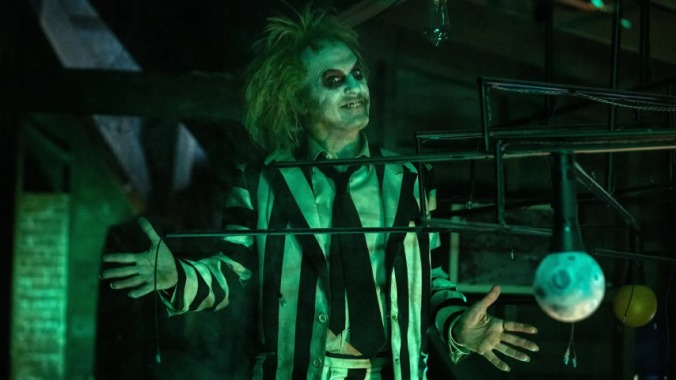Tim Burton Is Back in His Element of Amusingly Macabre Whimsy with Beetlejuice Beetlejuice

The prospect of the legacy sequel is one typically either tied up in motives of pure profitability or an exciting, newly realized opportunity to expand an old franchise in ways not explored before (and even the best of these latter types of belated follow-ups are typically generated by the former). More rare is the idea that a director of an older, original property could use the material not only as a chance to return to their roots, but to redeem themselves in doing so—getting their artistic groove back by returning to one of their most notable works. That’s what fantastical horror mainstay Tim Burton has done with Beetlejuice Beetlejuice.
While these legacy sequels can seem like craven cash-ins even at the best of times, Burton returning to the world that helped to kick his career into overdrive after he debuted with Pee-wee’s Big Adventure feels more shrewd than disingenuous. The quality of Burton’s films has always varied wildly, but ever since the 2010s it’s seemed Burton had lost touch with the heart of the analog, macabre weirdness that helped to establish his prominence in the first place, becoming the target of tepid responses or all-out critical ire with films like Dark Shadows, Big Eyes, Dumbo and Alice in Wonderland, one of the most egregious digital abominations that came out of the previous decade.
Beetlejuice Beetlejuice takes Burton back to what he does best: silly-scary horror-comedy that at once feels lovingly homespun and vibrantly realized. His ambitions aren’t high with this 35-years-later sequel, but they don’t have to be. In returning to a world with a solid foundation but relatively unexplored fringes, mysterious enough to expand on the rules of the afterlife or make them more pliable to his liking, Burton seems keen to let loose. His work isn’t bogged down like so many of his later films. It’s a trifling diversion, but it’s also Burton’s most comfortable, freewheeling and satisfying movie in years.
As implied, this is a Beetlejuice sequel through and through, bearing all the meaning that may have to you depending on your relationship to the original material. To me, it means a thinly sketched-out story with broad ideas of characters that exist to deliver an assembly line of clever, gross and funny sight gags which, to be fair, the film is packed to the brim with. This sequel’s existence harkens back to a time where something like this was released out of Hollywood without much in the way of pomp, nor circumstance. Though, Beetlejuice Beetlejuice acts as something of an inverse to its predecessor: Whereas the first film follows a relatively simple throughline of small-town domesticity coming crashing down under the sudden cognizance of life after death, its sequel is defined by an excess of storylines, all vying for their claim to a meager slice of the 100-minute runtime.
But where we begin is relatively simple: Years after her encounter with Betelgeuse (Michael Keaton) and the Maitlands, Lydia Deetz (Winona Ryder), still decked out in her goth attire, is now the host of a tacky haunted house reality show called Ghost House, produced by her overzealous boyfriend Rory (Justin Theroux). Death doesn’t take long to rear its head: Lydia receives word from her stepmother Delia (Catherine O’Hara) that her father Charles has died in a morbidly comic manner that allows him to be portrayed as headless once he’s revealed in the afterlife (a necessary choice to eschew the presence of disgraced actor Jeffrey Jones). Lydia, Delia and Rory pick up Lydia’s semi-estranged daughter Astrid (Jenna Ortega), whose disbelief in all this ghost crap only makes her further resent her mom following the death of her father. They return to the town of Winter River for the funeral—and to sell off the old house that the Deetz family once shared with the spirits of the Maitlands who, according to Lydia, have since figured out how to “move on.” (“How convenient,” quips Ortega.) It’s there that the old miniature diorama of the town is discovered by Astrid—as well as paraphernalia related to Betelgeuse that insinuates he may be primed to return.